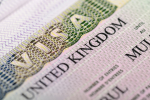US Embassy India Visa Warning Advisory. The US Embassy in India has released a crucial visa warning advisory in 2025, alerting Indian citizens about rising fraud attempts and misinformation related to the US visa application process.
- What is the US Embassy Visa Warning Advisory?
- Why Was the Advisory Issued?
- Who is Affected by the Advisory?
- Key Highlights of the Advisory
- Common Scams Targeting Indian Visa Applicants
- How to Apply for a US Visa Safely in 2025
- Official Channels vs. Fraudulent Agents
- Safety Tips Before and After Visa Approval
- FAQs About
- Is the visa warning advisory still valid in 2025?
- How do I identify a fake US visa site?
- Can I get a refund if I paid a scammer?
- Are social media posts offering visa help legitimate?
- Does the US Embassy charge additional fees beyond visa application?
- Conclusion
With increased online scams, fake agents, and phishing emails targeting hopeful travelers, the embassy is urging applicants to rely solely on official channels and avoid falling victim to fraudulent practices. This article provides a complete overview of the advisory, outlines scam trends, and shares safety tips for a smooth US visa application in India.
What is the US Embassy Visa Warning Advisory?
The US visa warning advisory is an official communication from the US Embassy India highlighting threats to the visa application process. It warns applicants about growing fraud cases where unauthorized agents, phishing sites, and fake social media accounts misguide visa seekers—often resulting in lost money or compromised personal data.
Related Posts
Why Was the Advisory Issued?
The advisory was prompted by several alarming developments, including:
- An increase in fraudulent agents selling fake visa appointments.
- Surge in phishing emails disguised as official visa confirmations.
- Emergence of scam websites copying the look of real embassy portals.
- Applicants being tricked into making payments via unofficial platforms.
These scams not only cause financial loss but can also result in permanent disqualification from obtaining a valid US visa.
Who is Affected by the Advisory?
| Category | How They’re Targeted |
|---|---|
| First-time applicants | Misled by unauthorized agents offering fake guidance |
| Student visa (F1) seekers | Victimized by fake calls claiming admission assistance |
| Tourist visa (B1/B2) | Lured by offers of expedited processing for extra fees |
| Employment visa (H1B, L1) | Tricked through fake interviews and documents |
All categories of travelers, students, tourists, professionals are at risk if they do not follow official US visa procedures.
Key Highlights of the Advisory
| Area of Concern | Advisory Details |
|---|---|
| Scam Agents | Do not use third-party agents unless authorized by the US Embassy |
| Fake Emails | Ignore and report emails requesting payments or personal details |
| Bogus Websites | Apply only through www.ustraveldocs.com/in |
| Social Media Fraud | Follow verified accounts only, such as @usembassyindia |
Common Scams Targeting Indian Visa Applicants
- Scam Callers pretending to be from the embassy requesting urgent action.
- Email Spoofing with fake DS-160 confirmations or interview letters.
- Agents offering guaranteed visa approvals for a fee.
- Fake portals that collect application details and payment fraudulently.
- Social media ads promising quick US visa slots.
Always double-check with official US embassy sources before proceeding.
How to Apply for a US Visa Safely in 2025
To avoid becoming a victim, follow these official steps:
Step-by-Step Process
- Go to the official US visa website: www.ustraveldocs.com/in
- Select the appropriate visa category.
- Fill the DS-160 form carefully.
- Pay your application fee using the website’s approved payment methods.
- Schedule your biometric and interview appointments.
- Track your application using your confirmation number.
Never pay cash or use UPI for visa payments unless instructed through official channels.
Official Channels vs. Fraudulent Agents
| Feature | Official Channels | Scam Agents |
|---|---|---|
| Website | ustraveldocs.com | Look-alike domains like “usvisainfo.org” |
| @ustraveldocs.com | Gmail/Yahoo/fake domains | |
| Payment | Via official bank or online options | UPI/WhatsApp/cash in hand |
| Support | Call centers & embassy staff | No contact or unverifiable numbers |
Safety Tips Before and After Visa Approval
- Use only verified portals for applications.
- Do not share personal information on WhatsApp or social media.
- Report any suspicious agents or calls to Indian cybercrime (cybercrime.gov.in).
- Retain all your receipts, confirmation emails, and interview details.
- If in doubt, contact the US Embassy India directly.
FAQs About
Is the visa warning advisory still valid in 2025?
Yes. Due to the consistent rise in fraud, the US Embassy India maintains this advisory to safeguard applicants.
How do I identify a fake US visa site?
Check for HTTPS, typos, strange URLs, and unverified contact details. Official site: ustraveldocs.com/in
Can I get a refund if I paid a scammer?
Unfortunately, no. You should report the fraud to local authorities and avoid repeat attempts through unofficial agents.
Are social media posts offering visa help legitimate?
Only follow verified embassy handles. Avoid posts that ask for payment or personal info in DMs.
Does the US Embassy charge additional fees beyond visa application?
No. All fees are displayed and paid through the official system. Beware of “urgent slot” fee scams.
Conclusion
The US Embassy India Visa Warning Advisory is a critical safeguard for Indian citizens applying for US visas in 2025. With rising fraud cases, staying informed and vigilant is essential. Always use official resources, avoid shady agents, and verify everything before paying or submitting your details. Your safety and visa success depend on it.










